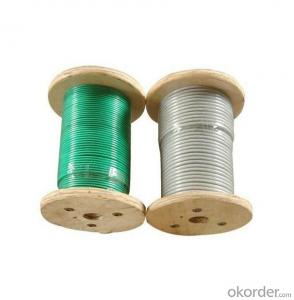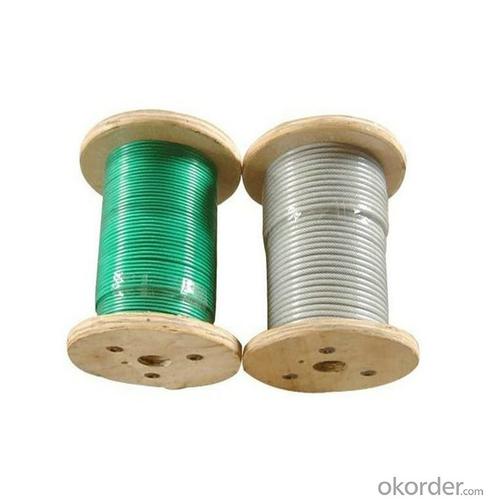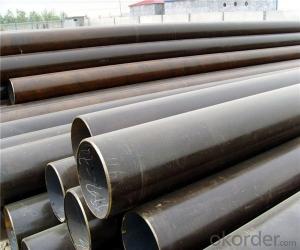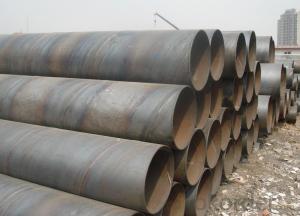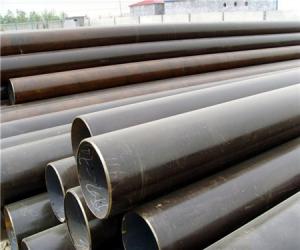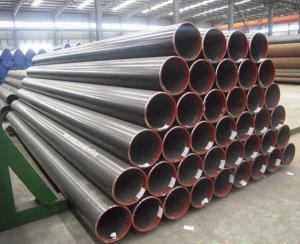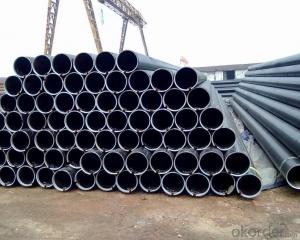Kinds of Color Plastic Coated Steel Wire Rope Hot Sale and High Quality
- Loading Port:
- Shanghai
- Payment Terms:
- TT OR LC
- Min Order Qty:
- 50 m.t.
- Supply Capability:
- 3000 m.t./month
OKorder Service Pledge
OKorder Financial Service
You Might Also Like
Specifications
dark blue plastic coated steel wire rope
Surface: dark blue PVC
T/S: 1770N/MM2
Size: 8mm-30mm
Raw material | quality carbon steel , 60# , 65#, 70#, 72A, 82B |
Standard | ISO, DIN, ASTM, GB, etc. |
Construction | 1X7, 1X19, 6X7, 7X7, 6X19, 7X19, 6X37, 7X37, 6X25, etc |
Range of products | (Galvanized, Ungalvanized, coated PVC /PE )steel wire rope Hot dip galvanized steel wire rope, etc |
Diameter | 2mm - 44mm |
Packing | plastic spool, wood reel, coils, bag, etc |
Delivery time | 35 days |
1. Name: dark blue plastic coated steel wire rope
2. Raw material: quality carbon steel , 60# , 65#, 70#, 72A, 82B
3. Standard: ISO, DIN, ASTM, GB, etc.
4. Construction: 1X7, 1X19, 6X7, 7X7, 6X19, 7X19, 6X37, 7X37, 6X25, etc.
5. Range of products: (Galvanized, Ungalvanized, coated PVC /PE )steel wire rope, Hot dip galvanized steel wire rope, etc.
6. Diameter: 8mm - 30mm
7. Packing : plastic spool, wood reel, coils, bag, etc.
8. Delivery time : 35 days
- Q: Can steel pipes be used in earthquake-prone areas?
- Yes, steel pipes can be used in earthquake-prone areas. Steel has high tensile strength and can withstand seismic forces better than other materials. Additionally, steel pipes can be designed to be flexible and resistant to bending and cracking during earthquakes, making them a suitable choice for infrastructure in such areas.
- Q: Are steel pipes suitable for underground industrial waste disposal?
- Yes, steel pipes are generally suitable for underground industrial waste disposal. Steel pipes are durable, resistant to corrosion, and can withstand high pressure, making them a reliable choice for transporting and disposing of industrial waste underground. Additionally, steel pipes have a long lifespan and can be easily maintained, reducing the risk of leaks or contamination.
- Q: How are steel pipes used in the agriculture sector?
- Steel pipes are commonly used in the agriculture sector for various purposes such as irrigation, drainage systems, and the transportation of water, chemicals, and fertilizers. They are also used in the construction of greenhouse structures and livestock enclosures, providing durability and strength to withstand harsh agricultural environments. Additionally, steel pipes are employed for post and pole applications, supporting fences and gates on farms.
- Q: How do you determine the wall thickness of a steel pipe?
- To determine the wall thickness of a steel pipe, there are a few methods you can use. The most common and accurate method is to measure it using a caliper or micrometer. First, ensure that the pipe is clean and free from any debris or rust. Then, take the caliper or micrometer and gently place it around the circumference of the pipe, making sure it is perpendicular to the surface. Carefully close the jaws of the measuring tool until they are snug against the pipe, but not so tight that they deform the shape. Once the jaws are closed, read the measurement displayed on the tool. This measurement represents the distance between the inner and outer diameter of the pipe, which is equal to the wall thickness. Alternatively, if you don't have access to a caliper or micrometer, you can use a pipe wall thickness gauge. These gauges have a set of pins or rollers that can be inserted into the pipe, providing you with an accurate measurement. Simply insert the pins into the pipe, ensuring they are properly aligned with the wall, and check the reading displayed on the gauge. It's important to note that when measuring the wall thickness of a steel pipe, you should take multiple readings at different points along the pipe to account for any variations. This will provide you with a more accurate average measurement.
- Q: Heating system DN40 and DN32 welded steel pipe how to connect?
- Welding: AC arc welding machine welding. Mode 1: apply to the medium of non demanding piping, DN40 steel pipe necking and DN32 steel pipe butt welding, or directly DN32 steel pipe into the DN40 internal welding. 2: the pipeline requirements apply to the inner wall of smooth transition, reducing short circuit welding for DN40x32 suppression of this mechanism are used for connection pipe seamless steel pipe high pressure pipeline connection, no special requirements, not commonly used welded steel pipe. Connection of mechanism fittings is not only costly, but not necessary unless special requirements are required!
- Q: How are steel pipes used in the manufacturing of oil refineries?
- Steel pipes are used extensively in oil refineries for various purposes. They are primarily used for transporting crude oil, refined petroleum products, and various chemicals within the refineries. These pipes are also crucial for the distribution of water, steam, and other fluids required for the refining processes. Additionally, steel pipes are used in the construction of various equipment and structures in oil refineries, including storage tanks, heat exchangers, and process units. Overall, steel pipes play a vital role in ensuring the safe and efficient operation of oil refineries.
- Q: What are the common methods for joining steel pipes?
- Different methods exist for joining steel pipes, depending on specific applications and requirements. Some commonly employed techniques include the following: 1. Welding: Among the most frequently used methods to join steel pipes, welding involves heating the pipe ends and applying pressure to fuse them. Various techniques can be employed, such as arc welding, MIG welding, TIG welding, and even laser welding. 2. Threaded connections: This method involves threading the ends of steel pipes to create male and female connections. These threaded ends are then screwed together using pipe threads. Threaded connections are typically utilized for smaller diameter pipes and in low-pressure applications. 3. Flanged connections: Flanges are employed to join steel pipes in situations that necessitate easy assembly and disassembly or frequent maintenance. Flanges are flat, circular discs with bolt holes that allow for the bolting of pipes together. They offer a robust and leak-proof connection. 4. Compression fittings: Compression fittings enable the joining of steel pipes without the need for welding or threading. They consist of a compression nut, compression ring, and compression sleeve. The nut is tightened onto the sleeve, compressing it against the pipe and creating a secure connection. 5. Grooved couplings: Mechanical connections are created with grooved couplings, which are utilized to join steel pipes. The pipe ends are grooved, and a gasket is inserted between the grooves. The couplings are then tightened, compressing the gasket and forming a tight seal. 6. Soldering or brazing: These methods involve the use of filler metal with a lower melting point than the steel pipes. The filler metal is heated and melted, allowing it to flow between the pipe joints and create a bond. Soldering is generally suited for smaller diameter pipes and low-pressure applications. Each joining method has its own advantages and limitations. The appropriate method for joining steel pipes depends on factors such as pipe diameter, application, working pressure, and required joint durability. It is crucial to consider these factors and consult industry standards and guidelines when selecting the suitable joining method for steel pipes.
- Q: Can steel pipes be painted or coated?
- Yes, steel pipes can be painted or coated. Painting or coating steel pipes is a common practice to protect them from corrosion, improve their appearance, or to meet specific industry requirements. The process involves cleaning the pipes to remove dirt, grease, and rust, followed by applying a primer and then the desired paint or coating. The choice of paint or coating depends on the intended use of the pipes. For example, epoxy coatings are often used for water or wastewater pipelines, while high-temperature resistant coatings are applied to pipes used in industrial settings. Overall, painting or coating steel pipes can enhance their durability and performance.
- Q: Can steel pipes be used for bridge piling?
- Yes, steel pipes can be used for bridge piling. Steel pipes are commonly used in bridge construction due to their strength, durability, and resistance to corrosion. They provide sufficient load-bearing capacity and can be driven deep into the ground to provide stable support for bridges.
- Q: How are steel pipes used in the construction of underground parking garages?
- Steel pipes are used in the construction of underground parking garages for various purposes, including providing structural support, serving as conduits for utilities such as water and electricity, and facilitating drainage systems. They are often used as deep foundation elements to support the weight of the structure and the vehicles above. Additionally, steel pipes are commonly used for installing fire suppression systems, ventilation systems, and plumbing connections within the parking garage.
Send your message to us
Kinds of Color Plastic Coated Steel Wire Rope Hot Sale and High Quality
- Loading Port:
- Shanghai
- Payment Terms:
- TT OR LC
- Min Order Qty:
- 50 m.t.
- Supply Capability:
- 3000 m.t./month
OKorder Service Pledge
OKorder Financial Service
Similar products
Hot products
Hot Searches
Related keywords
